
 i_need_contribute
i_need_contribute

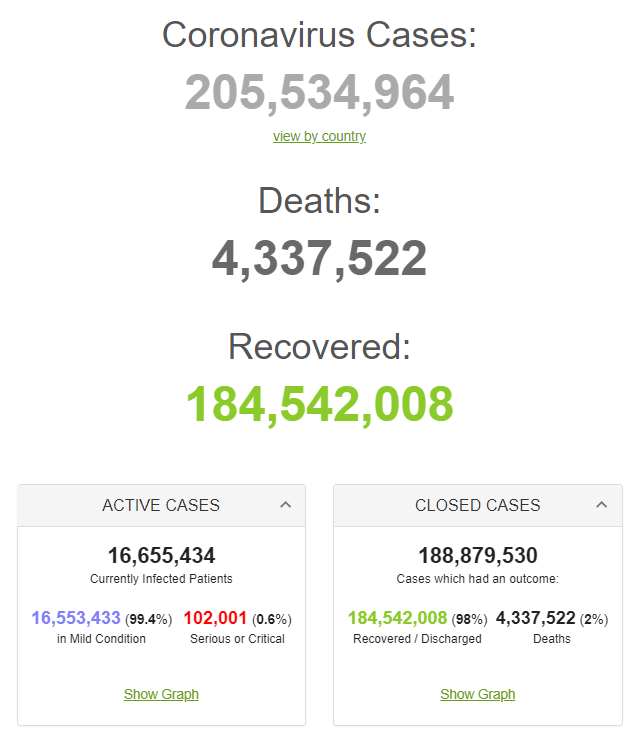
| Country, | Total | New | Total |
| Other | Cases | Cases | Deaths |
| World | 205,462,560 | 704,424 | 4,336,360 |
| USA | 37,055,916 | 143,459 | 635,219 |
| India | 32,076,974 | 43,641 | 429,702 |
| Brazil | 20,249,176 | 35,788 | 566,013 |
| Russia | 6,512,859 | 21,571 | 167,241 |
| France | 6,370,429 | 30,920 | 112,410 |
| UK | 6,146,800 | 29,612 | 130,607 |
| Turkey | 5,996,224 | 27,356 | 52,565 |
| Argentina | 5,052,884 | 11,397 | 108,388 |
| Colombia | 4,852,323 | 5,368 | 122,953 |
| Spain | 4,660,473 | 17,023 | 82,320 |
| Italy | 4,413,162 | 6,968 | 128,304 |
| Iran | 4,281,217 | 42,541 | 95,647 |
| Germany | 3,808,810 | 5,478 | 92,332 |
| Indonesia | 3,749,446 | 30,625 | 112,198 |
| Mexico | 2,997,885 | 19,555 | 245,476 |
| Poland | 2,884,557 | 198 | 75,289 |
| South Africa | 2,554,240 | 7,478 | 75,774 |
| Ukraine | 2,261,354 | 1,122 | 53,149 |
| Peru | 2,128,516 | 1,482 | 197,146 |
| Netherlands | 1,892,104 | 2,112 | 17,887 |
| Iraq | 1,740,933 | 8,635 | 19,402 |
| Philippines | 1,688,040 | 12,021 | 29,374 |
| Czechia | 1,675,450 | 263 | 30,371 |
| Chile | 1,625,456 | 633 | 36,157 |
| Canada | 1,445,305 | 1,872 | 26,688 |
| Bangladesh | 1,386,742 | 10,420 | 23,398 |
| Malaysia | 1,320,547 | 20,780 | 11,373 |
| Belgium | 1,143,127 | 1,748 | 25,279 |
| Sweden | 1,108,057 | 14,621 | |
| Romania | 1,085,738 | 326 | 34,331 |
| Pakistan | 1,080,360 | 4,856 | 24,085 |
| Japan | 1,054,491 | 10,579 | 15,311 |
| Portugal | 993,241 | 2,948 | 17,514 |
| Israel | 918,237 | 7,668 | 6,587 |
| Thailand | 816,989 | 21,038 | 6,795 |
| Hungary | 810,126 | 80 | 30,037 |
| Jordan | 779,530 | 511 | 10,158 |
| Switzerland | 731,148 | 2,120 | 10,918 |
| Serbia | 728,167 | 921 | 7,151 |
| Nepal | 723,296 | 2,616 | 10,180 |
| Morocco | 720,256 | 9,153 | 10,607 |
| UAE | 696,906 | 1,287 | 1,988 |
| Austria | 665,035 | 902 | 10,752 |
| Kazakhstan | 656,777 | 7,657 | 7,103 |
| Tunisia | 616,764 | 3,136 | 21,220 |
| Lebanon | 576,550 | 2,591 | 7,958 |
| Saudi Arabia | 535,927 | 751 | 8,366 |
| Greece | 524,871 | 3,472 | 13,106 |
| Ecuador | 493,148 | 1,317 | 31,837 |
| Cuba | 483,710 | 8,605 | 3,684 |
| Bolivia | 479,459 | 788 | 18,082 |
| Georgia | 461,198 | 5,352 | 6,230 |
| Belarus | 456,247 | 966 | 3,562 |
| Paraguay | 456,064 | 384 | 15,363 |
| Panama | 444,695 | 977 | 6,924 |
| Bulgaria | 430,410 | 782 | 18,306 |
| Costa Rica | 424,472 | 2,128 | 5,185 |
| Kuwait | 404,887 | 424 | 2,378 |
| Guatemala | 398,990 | 4,618 | 10,898 |
| Slovakia | 393,228 | 68 | 12,544 |
| Uruguay | 382,873 | 152 | 5,991 |
| Croatia | 365,716 | 381 | 8,275 |
| Azerbaijan | 357,058 | 2,396 | 5,095 |
| Dominican Republic | 345,118 | 282 | 3,975 |
| Sri Lanka | 342,079 | 2,987 | 5,464 |
| Myanmar | 341,300 | 3,739 | 12,452 |
| Denmark | 326,887 | 1,162 | 2,554 |
| Palestine | 318,435 | 254 | 3,615 |
| Ireland | 317,204 | 1,819 | 5,059 |
| Venezuela | 315,498 | 1,018 | 3,748 |
| Honduras | 310,610 | 1581 | 8,270 |
| Oman | 299,418 | 208 | 3,968 |
| Lithuania | 287,569 | 576 | 4,435 |
| Ethiopia | 286,286 | 873 | 4,450 |
| Egypt | 284,966 | 91 | 16,597 |
| Libya | 274,453 | 2472 | 3,811 |
| Bahrain | 270,451 | 161 | 1,384 |
| Moldova | 261,256 | 256 | 6,295 |
| Slovenia | 260,619 | 248 | 4,433 |
| Vietnam | 236,901 | 8,766 | 4,487 |
| Armenia | 233,001 | 391 | 4,664 |
| Qatar | 228,346 | 227 | 601 |
| S. Korea | 216,206 | 2219 | 2,135 |
| Kenya | 215,730 | 1,974 | 4,241 |
| Bosnia and Herzegovina | 206,655 | 179 | 9,694 |
| Zambia | 201,342 | 512 | 3,509 |
| Algeria | 184,191 | 844 | 4,654 |
| Nigeria | 179,908 | 790 | 2,195 |
| Mongolia | 176,993 | 1,433 | 863 |
| Kyrgyzstan | 170,353 | 382 | 2,420 |
| North Macedonia | 159,269 | 588 | 5,521 |
| Afghanistan | 151,563 | 272 | 6,988 |
| Norway | 142,321 | 322 | 807 |
| Latvia | 139,707 | 120 | 2,561 |
| Uzbekistan | 139,285 | 903 | 948 |
| Estonia | 135,856 | 344 | 1,279 |
| Mozambique | 135,528 | 1185 | 1,655 |
| Albania | 134,487 | 286 | 2,460 |
| Botswana | 130,771 | 1,832 | |
| Namibia | 121,603 | 96 | 3,226 |
| Australia | 37,378 | 365 | 945 |
| Suriname | 26,222 | 119 | 671 |
Retrieved from:https://www.worldometers.info/coronavirus/
By Lisa ShumakerPeter Szekely
California on Wednesday became the first U.S. state to require that its teachers and other school staff be vaccinated or regularly tested for COVID-19, a move Governor Gavin Newsom called "a responsible step" to ensure the safety of children.
The move comes as Texas Governor Greg Abbott's statewide ban on mask mandates hit its second legal setback after a judge in Dallas County temporarily blocked it from being enforced amid a nationwide rise in coronavirus cases.
Abbott and fellow Republican Governor Ron DeSantis of Florida have faced defiance over their statewide orders that prevent local officials from deciding whether to require that masks be worn.
Masks have become a divisive issue, often splitting the country along political lines, despite near universal agreement among health experts that they can limit the spread of the virus.
In Tennessee, over a hundred anti-mask protesters heckled masked people, including doctors and nurses, on Tuesday in Williamson County where the school board voted earlier to require masks for elementary students.
A video with nearly 2 million views on Twitter shows the crowd surrounding a masked man as he walked to his car. Protesters yelled: "We will find you" and "We know who you are. No more masks."
The vaccination requirement in California schools follows similar orders that applied to state employees and healthcare workers.
"We think this is a sustainable way to keeping our schools open, and to address the No. 1 anxiety that parents like myself have for young children," Newsom said at a briefing where he was flanked by state teachers' union officials who support the move.
Spurred by the Delta variant, the country's coronavirus cases have spiked to their highest levels in more than six months, according to a Reuters tally. New U.S. cases have increased more than five-fold over the past month with the seven-day average hitting 118,000 on Tuesday.
In response, the U.S. government and several states, along with some hospitals, universities and a growing number of private employers, have said they require employees to get inoculated. The White House said last week that almost 90% of U.S. educators and school staff are vaccinated.
New York City last week become the first major U.S. city to require proof of COVID-19 vaccination at restaurants, gyms and other businesses, starting next month.
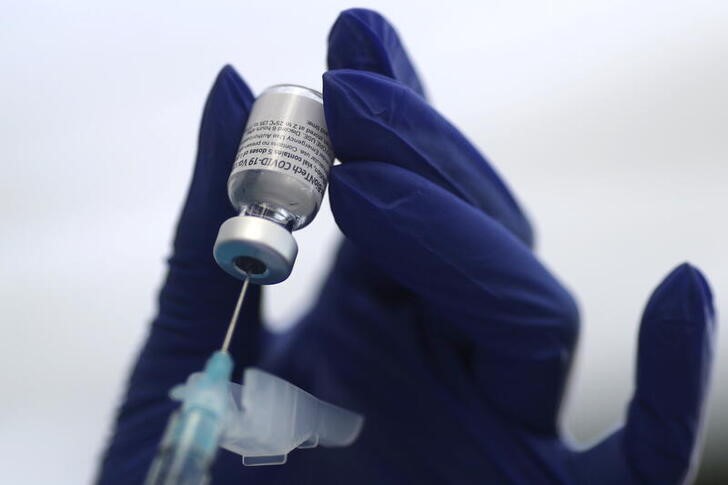
A healthcare worker prepares a Pfizer coronavirus disease (COVID-19) vaccination in Los Angeles, California, U.S., January 7, 2021. REUTERS/Lucy Nicholson
In Texas, the temporary order in Dallas issued late on Tuesday by Judge Tonya Parker allows officials in the state's second-most populous county to require masks indoors, despite Abbott's July order against such mandates. A hearing on Aug. 24 will determine whether to extend the temporary order.
The top elected official in Dallas County, Judge Clay Jenkins, who sought the court order issued late Tuesday, said preventative steps such as mask-wearing are needed to combat a spike in new cases of COVID-19.
"Models predict ongoing dramatic increases in cases and hospitalizations over the coming weeks that will exceed the peak earlier this year unless behavior change takes place," he said Tuesday on Twitter.
In a written statement, Abbott said that he had asked an appeals court to strike down Jenkins' action on masks, saying it clearly violated his executive order. The Texas Disaster Act, he continued, gives the governor the power to decided on such actions in an emergency.
"The path forward relies on personal responsibility - not government mandates," Abbott said.
Earlier on Tuesday, another Texas court granted an order at least until Monday that enables officials in San Antonio and Bexar Counties to require that masks be worn in public schools.
SOUTHERN EPICENTER
Oregon and Washington state are also grappling with surges in cases and hospitalizations as the outbreak spreads beyond the epicenter in the U.S. South.
Oregon Governor Kate Brown on Wednesday announced all state executive branch employees must be vaccinated, and she also reimposed a statewide indoor mask mandate.
The latest coronavirus wave is still the worst in Southern states, based on new cases and hospitalizations per capita in recent weeks.
Arkansas, Florida and Louisiana are all reporting record COVID-19 hospitalizations in recent days.
Florida's Broward County school board on Tuesday flouted an order by DeSantis that outlaws mask requirements in the state, prompting the administration of U.S. President Joe Biden, a Democrat, to say it was considering supporting the school districts financially if DeSantis retaliates against them by withholding funds from officials' salaries.
Retrieved from:https://www.reuters.com/world/us/texas-governors-ban-mask-mandates-dealt-second-legal-blow-2021-08-11/
By Sarah Marsh
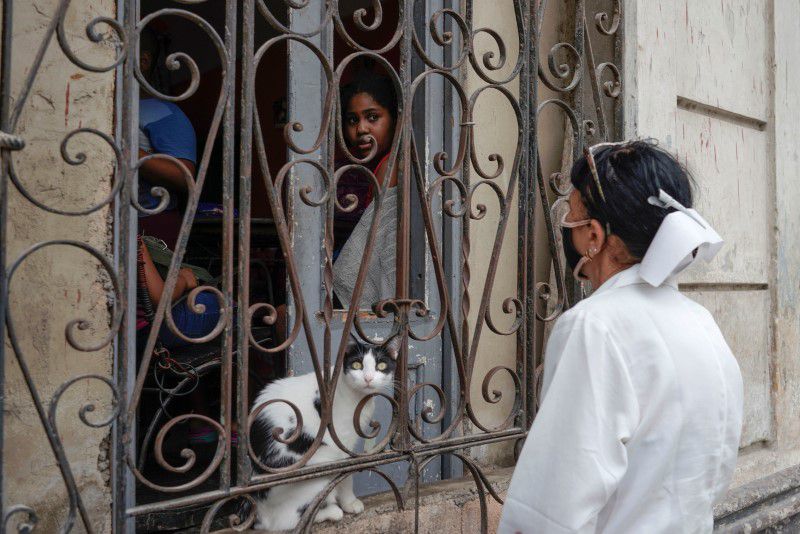
FILE PHOTPO: A nurse asks a family to get vaccination at a vaccination center amid concerns about the spread of the coronavirus disease (COVID-19), in Havana, Cuba, June 17, 2021. REUTERS/Alexandre Meneghini
Cuba is bringing back hundreds of doctors working abroad and converting hotels into isolation centers and hospitals in order to battle a COVID-19 crisis that is overwhelming healthcare and mortuary services in parts of the Caribbean island.
The country, which managed to contain infections for most of last year, is now facing one of the worst outbreaks worldwide, fueled by the spread of the more-infectious Delta variant, even as it races to vaccinate its population.
Cuba's rolling seven-day average of confirmed COVID-19 cases has surged eightfold within two months to 5,639 per million inhabitants, ten times the world average.
One in five tests are positive, four times the benchmark 5% positivity rate cited by the World Health Organization. The seven-day average for confirmed COVID-19 deaths is around 52 per million inhabitants, six times the world average, although the real number could be much higher accounting for potentially undiagnosed cases.
The COVID-19 surge has come amid Cuba's worst economic crisis in decades that had already resulted in medicine shortages and long queues for scarce goods that made implementing lockdowns tricky.
The predicament has come as a shock to some in the Communist-run country where the right to public healthcare is considered sacrosanct.
"I witnessed queues of more than 20 hours, people dying in the corridors (of the polyclinic)," wrote Ana Iris Diaz, a professor at the university of the central Cuban city of Santa Clara and self-professed "revolutionary", in a Facebook post that went viral this week.
"I saw an elderly woman die after several hours of waiting and four days without an antigen test or PCR. Simply put, I saw what I would have hoped to never see: the collapse of our health system."
Cuba's Communist government did not reply to a request for comment. It has denounced the United States for tightening sanctions, saying this has also slowed down its vaccine rollout due to the difficulty of acquiring inputs. Critics blame more Cuba's inefficient state-run economy.
"We are at the limit of our capacity for infrastructure, resources, medicine and oxygen," President Miguel Diaz-Canel told a government meeting on COVID-19 on Monday.
INCINERATOR BREAKS UNDER STRAIN
Cuba was a COVID-19 success story last year, managing to contain the outbreak, dispatching doctors all over the globe to help and even developing its own vaccines, which it started applying in recent months.
Deaths in Cuba since the start of the pandemic are still only a half of the global average, according to official data.
The death toll is rising fast though.
In the eastern province of Guantanamo, artist Daniel Ross said a 30-year-old friend of his who caught COVID-19 had recently died due to a lack of medicines and oxygen.
"Here, we fight COVID-19 with Azitromicina, which costs 16 pesos usually in the pharmacy, but they haven't had any for months now," he said, adding that the cost had surged to 3600 pesos, equivalent to $150 on the black market.
Also infected and struggling to breathe, he said he was doing inhalations with yagruma leaves but sometimes could not even heat water because of the power outages that have become more frequent lately.
Ihosvany Fernandez, director of communal services in the province of Guantanamo, said on local television that total deaths there, from any cause, had surged at the start of the month to more than 60 per day from around 12 on average usually.
Official data show no more than 10 COVID-19 death daily in Guantanamo for those days suggesting underreporting in deaths from the respiratory disease.
One of the province's incinerators had broken down due to overuse, said Fernandez, so they were installing another and using a variety of state vehicles to transport the corpses given insufficient hearses.
So far, a quarter of Cuba's 11.2 million inhabitants have been innoculated with its two most advanced vaccines that officials say have proven more than 90 % effective in phase three trials.
In one bright spot, the case-fatality rate in Havana, where nearly two thirds of the population has now been fully innocculated, was just 0.69 % compared to 0.93% for the rest of the country in the first week of August, according to official data, suggesting the shots are working.
Retrieved from:https://www.reuters.com/world/americas/coronavirus-surge-pushes-cubas-healthcare-system-brink-2021-08-11/
By Pushkala Aripaka
Three new conditions reported by a small number of people after vaccination with COVID-19 shots from Pfizer (PFE.N) and Moderna (MRNA.O) are being studied to assess if they may be possible side-effects, Europe's drugs regulator said on Wednesday.
Erythema multiforme, a form of allergic skin reaction; glomerulonephritis or kidney inflammation; and nephrotic syndrome, a renal disorder characterised by heavy urinary protein losses, are being studied by the safety committee of the European Medicines Agency (EMA), according to the regulator.
Pfizer, by far the biggest supplier of COVID-19 vaccines to the European Union, and Moderna did not immediately respond to Reuters requests for comment.
Just over 43.5 million doses of Moderna's vaccine, Spikevax, have been administered in the European Economic Area as of July 29, the EMA said, compared to more than 330 million doses of the Pfizer shot, Comirnaty, developed with Germany's BioNTech (22UAy.DE).
Last month, the EMA found a possible link between very rare heart inflammation and the mRNA vaccines. However, the European regulator and the World Health Organization have stressed that benefits from these vaccines outweigh any risks.
The watchdog did not give details on Wednesday on how many cases of the new conditions were recorded, but said it had requested more data from the companies. The EMA did not recommend changes to the labelling of the vaccines.
It disclosed the new assessments as part of routine updates to the safety section of all authorised vaccines' database and added menstrual disorders as a condition it was studying for vaccines, including those from AstraZeneca (AZN.L) and J&J (JNJ.N), after the EMA's update last week.
Moderna's shares, which have climbed more than 75% to Tuesday's close since mid-July when it joined the S&P 500 index (.SPX), fell about 16% to $384 on Wednesday.
BioNTech's U.S.-listed shares were down 14.4% and Pfizer nearly 4%.
Retrieved from:https://www.reuters.com/business/healthcare-pharmaceuticals/eu-drugs-regulator-looking-new-possible-side-effects-mrna-vaccines-2021-08-11/
By Geert Clercq
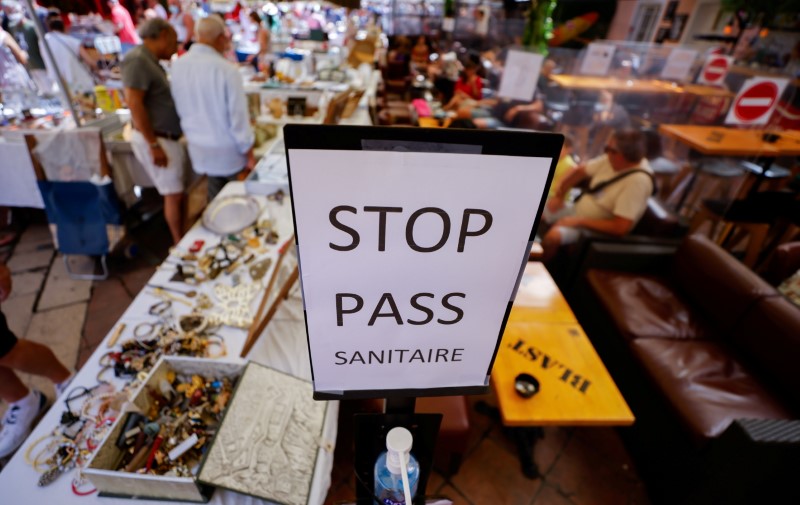
A coronavirus disease (COVID-19) health pass poster is seen in a restaurant as France brings on tougher restrictions where a proof of immunity will now be required to access most public spaces and to travel by inter-city train, in Nice, France, August 9, 2021. REUTERS/Eric Gaillard/File Photo
Vandals have attacked more than 20 vaccination centres and other health facilities, daubing some with Nazi-themed slogans, as the French government steps up its COVID-19 vaccination drive.
Anger has been fueled by the introduction of a health pass showing proof of vaccination or a recent negative COVID-19 test which is now mandatory for entering restaurants, trains and other public places.
Over the past four weekends protesters have marched against the health pass, saying it restricts individual freedom. read more
Since July 12, a total of 22 health facilities have been have attacked defaced, including 15 vaccination centers, five COVID-19 test centers and one medical lab, an interior ministry official told Reuters on Wednesday.
Across the country, vaccination centres and outdoor testing facilities at pharmacies have been tagged with swastikas and graffiti such as "collaborator", "Nazi" and "genocide".
The same slogans have also been seen at some of the demonstrations against the health passes.
In the Loire valleytown of Neuille-Pont-Pierre last month Stars of David - similar to those Jews were forced to wear by the Nazis - were painted on vaccination centre signs.
"We are cleaning off these horrors, this is odious. Other centres have also been hit by these racist and cowardly attacks," Neuille-Pont-Pierre mayor Michel Jollivet said on BFM television.
In Lans-en-Vercors, southeast France, anti-vaccine graffiti were painted on a community hall that housed a vaccine centre and fire hoses were opened, flooding the facility, local newspaper Le Dauphine reported.
"Wrecking a vaccination centre speaks volumes about the motives of the perpetrators, who will be tracked down," Health Minister Olivier Veran said in a tweet.
In Urrugne, in the Pyrenees, the tent of a temporary vaccination centre was set on fire, while in Audincourt, eastern France, the power supply to a vaccination centre was cut off, endangering vaccine doses in fridges.
"There is no doubt that the vaccination centre was targeted," Audincourt's mayor Martial Bourquin told L'Express.
On Sunday, staff at a Toulouse vaccination centre found a note saying "One day, all this will blow up", local media reported.
Interior Minister Gerald Darmanin said perpetrators will be severely punished but so far no major arrests have been made.
France has registered more than 112,000 COVID-19 deaths and a total of 6.33 million cases.
Following a slowdown in infections after France's third lockdown this spring, the more infectious Delta variant has led to spike in new cases, now at more than 22,000 per day on average.
Retrieved from:https://www.reuters.com/world/europe/french-covid-19-centres-hit-by-anti-vaccine-vandalism-2021-08-11/
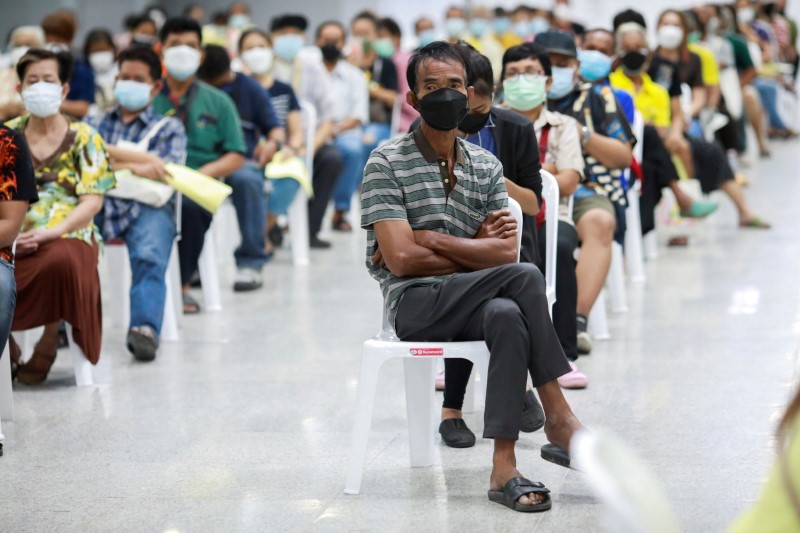
People queue at the Central Vaccination Center as Thailand begins offering first doses of the AstraZeneca vaccine to at-risk groups amid the coronavirus (COVID-19) outbreak in Bangkok, Thailand, July 26, 2021. REUTERS/Soe Zeya Tun
Thailand on Thursday reported a record 22,782 new coronavirus cases, brining total cases to 839,771, data from the country's COVID-19 task force showed.
It also reported 147 new deaths, taking total fatalities to 6,942.
Retrieved from:https://www.reuters.com/world/asia-pacific/thailand-reports-record-22782-coronavirus-cases-2021-08-12/
By Andrew Sparrow
Health secretary says England’s vaccinated and under-18s will be advised to take PCR test instead from 16 August
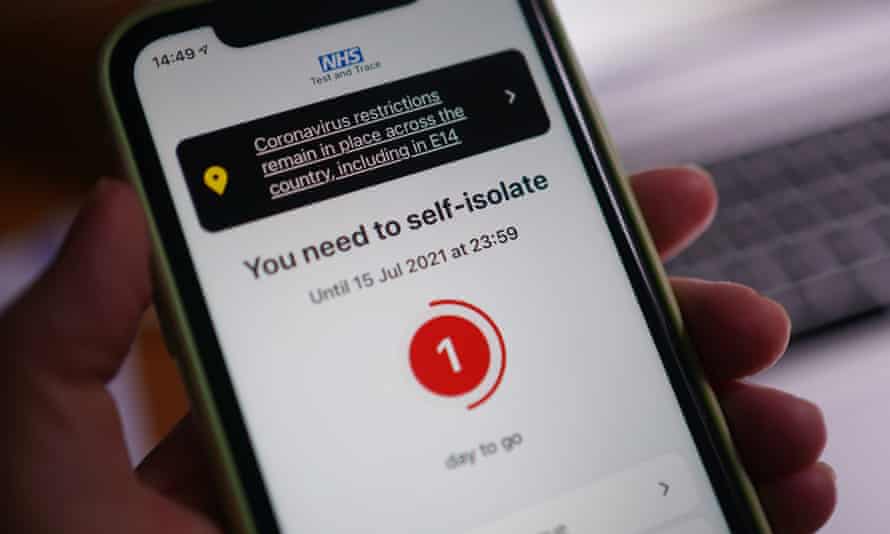
Boris Johnson has been under pressure to bring forward the end to self isolation for the double-jabbed, because of disruption caused by the “pingdemic”. Photograph: Yui Mok/PA
Fully vaccinated people in England will no longer be legally required to self-isolate upon contact with a positive Covid case from Monday, and will instead be advised to take a PCR test – in a marked shift from rules that have led to more than 14m instructions to stay at home.
Ministers have confirmed that the legal requirement to isolate will be replaced with non-binding advice to take a test for the double-jabbed, as well as those 18 and under. And those who do come into contact with the infected will not be told to isolate while waiting for their results. For people who do test positive, isolation will continue.
The health secretary, Sajid Javid, said on Wednesday night that the government was able to go ahead with the decision to exempt the fully vaccinated from isolation rules on Monday 16 August, as planned, because “getting two doses of a vaccine has tipped the odds in our favour and allowed us to safely reclaim our lost freedoms”.
Although Boris Johnson was under pressure from business to bring forward the 16 August date, because of disruption caused by the “pingdemic”, he said last month that timetable was “nailed on” and there was no likelihood of it being moved.
But when the details were announced on Wednesday night, they were less restrictive than they might have been. The fully vaccinated and over-18s will only be advised to get a PCR test if they are a close contact of a positive case, not required to, and they will not be expected to isolate while they await the results of the test.
And, for young people, in practice the cut-off point will be 18 years and six months, because people turning 18 will be exempt from isolation for another six months to allow them time to get fully vaccinated.
The new regime should also end the mass disruption of schooling when pupils return to class next month because it will allow the “bubbles” system – that contributed to almost a quarter of pupils being out of school for Covid-related reasons by the end of the summer term – to be abandoned.
According to the official data, there have been more than 9m calls to people since the pandemic began from the English test-and-trace service telling them that they must isolate. Until now, this has been a legal requirement.
There have also been more than 5m alerts sent by the Covid app in England telling people they should isolate for the same reason, although these “pings” have not been legally binding for the recipients.
People who can prove they cannot be vaccinated for medical reasons will also be exempt from isolation rules. And anyone who was told before 16 August to go into isolation, with their isolation period due to end after 16 August, will instead be able to leave isolation from Monday.
Because people who have been fully vaccinated can still get infected, if they have been in contact with someone testing positive, they will be advised to take precautions like wearing masks in enclosed spaces, and limiting contact with others, especially clinically extremely vulnerable people.
Health and social care workers who are close contacts of a positive case will be allowed to return to work after a negative PCR test, but they will have to take daily lateral flow tests as a precaution.
The government is continuing to set up workplace testing centres so that workers doing critical jobs who are not fully vaccinated can use daily testing as an alternative to isolation.
Retrieved from:https://www.theguardian.com/world/2021/aug/11/no-need-for-fully-jabbed-covid-contacts-to-isolate-from-monday-confirms-javid
By John Power
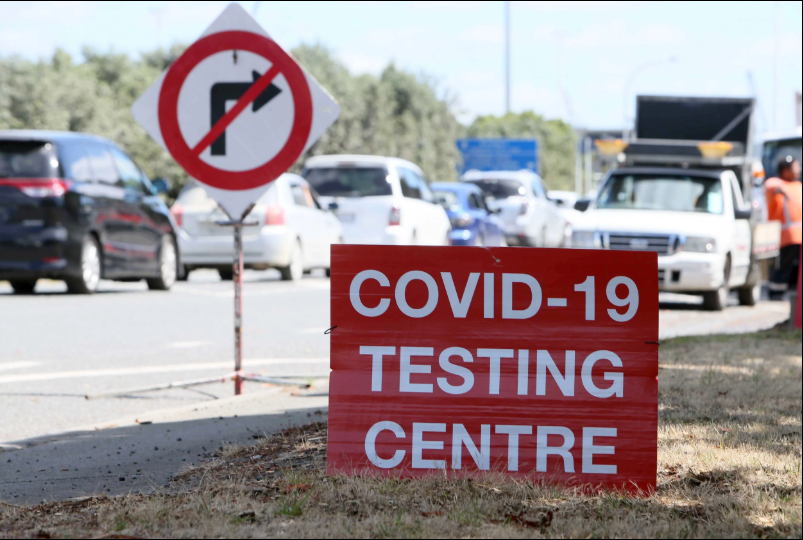
Signs direct drivers waiting for a Covid-19 test at a pop-up centre at Marsden Point, New Zealand. Photo: AP
New Zealand on Thursday laid out its plan for reopening its borders, the latest “zero-Covid” economy to confront the difficult task of charting a path out of international isolation during the pandemic.
Prime Minister Jacinda Ardern said the government would speed up its vaccine roll out this year and begin a phased reopening of the border in early 2022. Vaccinated travellers from low-risk countries will eventually be able to enter New Zealand without going into quarantine, she said.
Like other Asia-Pacific economies such as Australia, mainland China, Hong Kong, and Taiwan, New Zealand has relied heavily on tough border controls to keep the pandemic at bay. No Delta variant cases have been discovered in the community so far, and the country has recorded one of the lowest death tolls from Covid-19 in the world, with just 26 fatalities.
Residents have largely enjoyed life as normal for most of the pandemic, though a quarantine-free travel bubble with neighbour Australia was suspended last month due to rising Delta variant cases there.
After the worst recession in decades last year, the economy has rebounded strongly, with GDP growing 1.6 per cent in the first three months of 2021.
But as with its “zero-Covid” peers, the country’s strategy has left it at risk of long-term international isolation and decimated key industries such as tourism and international education. Similarly to Australia and Hong Kong, New Zealand’s vaccination drive has also lagged other developed economies, with only about 20 per cent of adults fully jabbed, in part due to complacency associated with jurisdictions where the virus does not feel like an immediate threat.
On Thursday, Ardern said the government would make the Pfizer vaccine available to all adults sooner than planned, with all eligible people able to book a vaccination appointment from September 1.
The government will also use the second half of this year to conduct a self-isolation trial for vaccinated New Zealanders in preparation for the gradual resumption of quarantine-free travel. From the first quarter of next year, new risk-based border settings will be introduced that establish low, medium and high-risk pathways into the country.
The pathway a traveller takes will be based on the risk associated with where they are coming from and their vaccination status, and each pathway will have testing and isolation requirements proportionate to that risk.
A low-risk pathway will permit quarantine-free entry for vaccinated travellers; a medium-risk pathway would include a combination of self-isolation and/or reduced managed isolation for vaccinated travellers, while a high-risk pathway will require a full 14 days in quarantine and testing regardless of vaccination status.
Last month, Australia, which is grappling with Delta variant-fuelled outbreaks in New South Wales and Victoria, announced plans to phase out lockdowns once 70 per cent of adults were vaccinated, and reopen borders to “safe” countries once coverage reached 80 per cent.
Hong Kong on Monday began allowing fully vaccinated arrivals from most countries to reduce hotel quarantine to seven days, but has yet to indicate when it might broadly reopen its borders.
Although New Zealand’s pandemic response has won widespread public support, there are signs of growing public frustration with the government’s handling of the recovery.
In an opinion poll released earlier this month, public approval of Ardern’s centre-left Labor Party fell almost 10 points to 43 per cent, although support remained well ahead of the rival National Party.
Neil Carr, a professor at the University of Otago’s tourism department, said the tourism sector in particular had increased pressure on Ardern’s government to find a way out of the pandemic.
“The lack of international visitors has resulted in a downturn for many businesses and they are rightly keen to see international visitors returning,” Carr said.
“Yet at the same time domestic tourism is very buoyant and those businesses in the sector that have managed to be light and agile have coped better. There are also concerns in the sector about a dearth of people to fill posts in the industry that has for a long time been filled by international temporary migrants or those on working holiday visas.”
John Gibson, an economics professor at the University of Waikato in Hamilton, New Zealand, said before Ardern’s announcement that he had low expectations for the government’s plans.
“The Ardern government is infamous for making announcements about announcements and the event this week is along those lines,” Gibson said.
Gibson said many New Zealanders felt comfortable with the status quo, in part due to low unemployment and rising house prices.
“So despite restrictions on international mobility, there is a large proportion of the population who are happy with the situation as it is as they feel wealthier and secure in their jobs,” he said. “The government has manifestly failed to deliver on many previous promises, so Covid is one of the few things they feel they can highlight, electorally, so they have very little reason to change the status quo on this issue even as the rest of the world moves on.”
Said Michael Plank, a statistician at the University of Canterbury whose modelling informed New Zealand’s pandemic strategy: “I think everyone recognises that border closures have costs and we can’t keep Covid out forever. But we do need to remain cautious at least until everyone has had the opportunity to be vaccinated.”
“Seeing how difficult New South Wales is finding it to control their outbreak reinforces how dangerous the Delta variant is and how crucial it is to keep it out.”
Retrieved from:https://www.scmp.com/week-asia/health-environment/article/3144672/zero-covid-new-zealand-outline-plans-reopening-borders